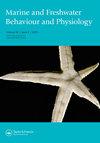大鳞地蟹迁移与换羽的关系:饥饿对有节奏垂直迁移的影响
IF 0.9
4区 生物学
Q3 MARINE & FRESHWATER BIOLOGY
Marine and Freshwater Behaviour and Physiology
Pub Date : 2023-02-12
DOI:10.1080/10236244.2023.2171876
引用次数: 0
摘要
巨爪地蟹采用周期性垂直迁移的方式,利用涨潮运输(FTT)到达定居或育蟹栖息地,并以高速率换羽,这与途中低食物可得性不匹配。为了解释这种“错配问题”,我们假设除了发育之外,饥饿也会影响巨足象的迁移,因此换羽可能性低的饥饿巨足象无法成功迁移。通过研究饥饿如何影响中华绒螯蟹(Eriocheir sinensis) megalopae的节律性垂直迁移,验证了这一假设。这一发现支持了我们的假设,表明饥饿削弱了巨蛛的垂直迁徙。结果还表明,饥饿导致巨翅虫的剩余垂直迁移除了遵循昼夜节律外还遵循昼夜节律。我们认为,对于大鳞地蟹来说,运输和发育一样受营养的控制;中华绒螯蟹的发育与迁移之间存在着一种权衡关系。本文章由计算机程序翻译,如有差异,请以英文原文为准。
Correlation between transport and moulting of catadromous crab megalopae: The effects of starvation on rhythmic vertical migration
ABSTRACT Adopting circatidal vertical migration, catadromous crab megalopae use flood tide transport (FTT) to reach the settlement or nursery habitat and moult at a high rate that mismatches the low food-availability en route. To explain this “mismatch problem,” we hypothesize that besides development, starvation also affects megalopae’s transport so that the starved ones with low moulting possibility cannot succeed migration. The hypothesis was tested by studying how starvation affected rhythmic vertical migration of Chinese mitten crab (Eriocheir sinensis) megalopae. The findings support our hypothesis by showing that starvation weakened the vertical migration of the megalopae. The results also revealed that starvation caused the residual vertical migration of the megalopae to follow a circadian rhythm in addition to circatidal rhythm. We conclude that for catadromous crab megalopae, transport, just as development, is controlled by nutrition; and there exists a trade-off between the development and transport of Chinese mitten crab megalopae .
求助全文
通过发布文献求助,成功后即可免费获取论文全文。
去求助
来源期刊

Marine and Freshwater Behaviour and Physiology
生物-海洋与淡水生物学
CiteScore
2.10
自引率
0.00%
发文量
9
审稿时长
>12 weeks
期刊介绍:
Marine and Freshwater Behaviour and Physiology is devoted to the publication of papers covering field and laboratory research into all aspects of the behaviour and physiology of all marine and freshwater animals within the contexts of ecology, evolution and conservation.
As the living resources of the world’s oceans, rivers and lakes are attracting increasing attention as food sources for humans and for their role in global ecology, the journal will also publish the results of research in the areas of fisheries biology and technology where the behaviour and physiology described have clear links to the contexts mentioned above.
The journal will accept for publication Research Articles, Reviews, Rapid Communications and Technical Notes (see Instructions for authors for details). In addition, Editorials, Opinions and Book Reviews (invited and suggested) will also occasionally be published. Suggestions to the Editor-In-Chief for Special Issues are encouraged and will be considered on an ad hoc basis.
With the goal of supporting early career researchers, the journal particularly invites submissions from graduate students and post-doctoral researchers. In addition to recognising the time constraints and logistical limitations their research often faces, and their particular need for a prompt review process, accepted articles by such researchers will be given prominence within the journal (see Instructions for authors for details).
 求助内容:
求助内容: 应助结果提醒方式:
应助结果提醒方式:


